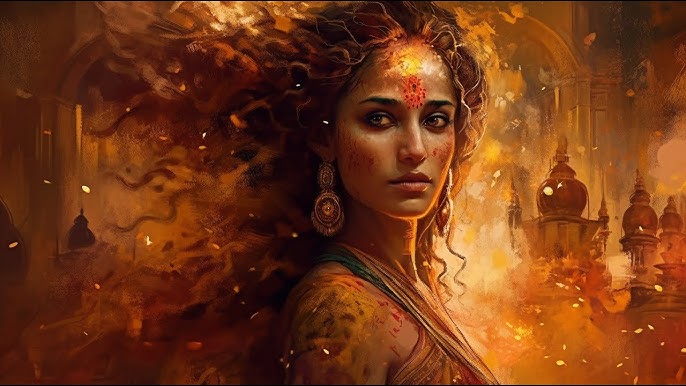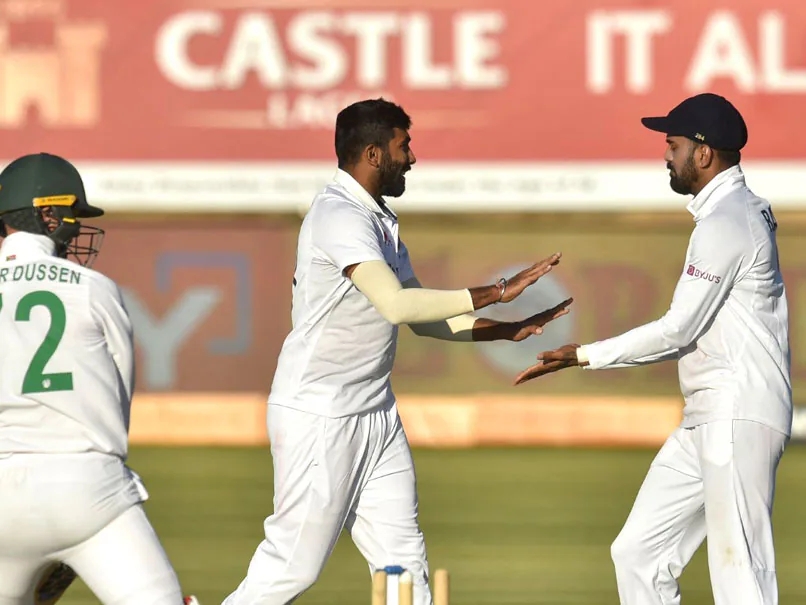सुन्दरीं पतिव्रतां तां स्वधर्मनिष्ठामृतात्मजाम्।
प्रत्यालिङ्ग्य तु वैदेहीं रुरोद लक्ष्मणो गुरुः॥
Transliteration:
sundarīṁ pativrataṁ tāṁ svadharmanisṭhāmṛtātmajām।
pratyāliṅgya tu vaidehīṁ ruroda lakṣmaṇo guruḥ॥
Translation:
Lakshmana, the devoted husband,
Embracing his virtuous wife, Urmila,
Wept bitterly for his dear spouse,
Separated from her, he grieved.
This verse reflects the deep love and separation between Lakshmana and Urmila in the Ramayana epic.
तमुवाच दशग्रीवो राक्षसेन्द्रो
हर्षेण विपुलेन तं समाधिना।
पश्याशु ते तामृतात्मजां मुक्ताम्
दीप्यमानां मम चेष्टितां तदा॥
Transliteration:
tamuvāca daśagrīvo rākṣasendro
harṣeṇa vipulena taṁ samādhinā।
paśyāśu te tāmṛtātmajāṁ muktām
dīpyamānāṁ mama ceṣṭitāṁ tadā॥
Translation:
Ravana, the King of the demons, then said to him,
With immense delight and arrogance, he spoke:
“Behold your dear wife, now released,
She shines brightly under my command.”
This verse portrays the moment when Ravana, the antagonist in the Ramayana, taunts Lakshmana about Urmila’s captivity, adding to Lakshmana’s grief and resolve to rescue her.
लक्ष्मणोऽपि दुःखितो राममुवाच
निहत्य बलं तामृतात्मजां रुदन्तम्।
“पत्युर्मम त्वामुपगच्छ सुप्रभं
यस्मिन्नवस्थितः सि ममेकमात्मनि॥”
Transliteration:
lakṣmaṇo’pi duḥkhito rāmamuvāca
nihatya balaṁ tāmṛtātmajāṁ rudantam।
“patyurmama tvāmupagaccha suprabhaṁ
yasminnavasthitaḥ si mamekamātmani॥”
Translation:
Lakshmana, also distressed, said to Rama,
Overcoming the army and rescuing Urmila, who weeps:
“Return to your husband, radiant one,
In whom you dwell as my very soul.”
This verse captures Lakshmana’s sorrow and determination to reunite with Urmila and brings forth the theme of love, separation, and the strength of devotion in the Ramayana.
स्वयंप्रियां पतिव्रतां त्वां वनेऽस्मि निर्जितो बलैः।
राक्षसेन्द्रः सहापेक्ष्य सीतामायाति रावणः॥
Transliteration:
svayaṁpriyāṁ pativratāṁ tvāṁ vane’smi nirjito balaiḥ।
rākṣasendraḥ sahāpekṣya sītāmāyāti rāvaṇaḥ॥
Translation:
“I am here in the forest, defeated by the enemy’s forces,
Without my beloved wife, who is devoted to her husband.
Meanwhile, Ravana, the King of the demons, approaches Sita.”
This verse reflects Lakshmana’s agony in the forest, feeling defeated and separated from Urmila, while also expressing his concern for Sita, who is in the clutches of Ravana. It highlights the theme of separation and the trials faced by the characters in the Ramayana.
त्वया हि सह सीताया प्राणसंयमकारिणा।
सत्यसन्धा गुणैर्युक्ता त्वया नाहं विचेष्टिता॥
Transliteration:
tvayā hi saha sītāyā prāṇasaṁyamakāriṇā।
satyasandhā guṇairyuktā tvayā nāhaṁ vicesṭitā॥
Translation:
“It is you who, with unwavering devotion to Sita,
Have maintained her life with your self-control.
She, virtuous and endowed with noble qualities,
Is not in distress because of your absence.”
In this verse, Lakshmana consoles himself by acknowledging his own qualities and the devotion he has shown toward Sita, which has helped her during his separation. This reflects the inner strength and commitment of the characters in the Ramayana despite the pain of separation.
रावणस्य समीपे तु दिव्ययानेन लक्ष्मणः।
सीतायाः सन्निधौ दृष्ट्वा संभ्रान्तं पुनरब्रवीत्॥
Transliteration:
rāvaṇasya samīpe tu divyayānena lakṣmaṇaḥ।
sītāyāḥ sannidhau dṛṣṭvā saṁbhrāntaṁ punarabravīt॥
Translation:
Lakshmana, in the divine chariot, arrived near Ravana’s abode.
Seeing Sita’s proximity, he became overwhelmed and spoke again:
“सीते जीवसि का विप्रिया वा कान्तस्यापि वर्तते।
अन्ये चापि कथं त्वाम् वा धर्मात्मानो विचिन्तयन्ति॥”
Transliteration:
sīte jīvasi kā vipriyā vā kāntasyāpi vartate।
anye cāpi kathaṁ tvām vā dharmātmāno vicintayanti॥
Translation:
“O Sita, are you living willingly or does your beloved’s memory sustain you?
How are you bearing this situation? Righteous souls are also concerned for you.”
In this verse, Lakshmana arrives near Ravana’s palace and is deeply concerned for Sita’s well-being. He questions whether she is living with the hope of reunion or if there is some other reason for her endurance. This verse reflects the emotional depth of the characters in the Ramayana and the pain of separation.
सीता उवाच:
“वैदेहोऽहं पतिव्रता भवान्नान्यस्यास्ति सर्वथा।
राघवस्य हृदि स्थानं न जाने वद किं त्वयि॥”
Transliteration:
sītā uvāca:
“vaideho’haṁ pativrata bhavānnānyasyāsti sarvathā।
rāghavasya hṛdi sthānaṁ na jāne vada kiṁ tvayi॥”
Translation:
Sita replied:
“I am the devoted wife of Vaideha, and there is no other for me in any way.
I do not know any place in the heart other than in Raghava (Rama). Tell me about yourself.”
In this response, Sita reaffirms her unwavering love and devotion to Rama, emphasizing that he is the only one who resides in her heart. She shows her loyalty despite the separation, highlighting the profound bond between her and Rama.
लक्ष्मणोऽपि ततः तां सीतां विचिन्त्य पुनरब्रवीत्।
“स्वामिनी चारुहासिनी कृपया त्वं मां परीत्यज।
त्वया दण्डकवने रक्षिता राघवेण च।”
Transliteration:
lakṣmaṇo’pi tataḥ tāṁ sītāṁ vicintya punarabravīt।
“svāminī cāruhāsinī kṛpayā tvaṁ māṁ parītyaja।
tvayā daṇḍakavane rakṣitā rāghaveṇa ca।”
Translation:
Lakshmana, pondering over these words, spoke again to Sita:
“Noble lady, with your charming smile, kindly leave me.
You were protected in the Dandaka forest by both me and Raghava (Rama).”
In this verse, Lakshmana, after learning of Sita’s unwavering devotion to Rama, acknowledges her innocence and the protection they provided in the Dandaka forest. He urges her to go to her beloved, demonstrating his understanding and concern for her well-being.
सीता उवाच:
“लक्ष्मण त्वं मया पूर्णो धर्मो यत्र निवर्तते।
दुःखेन नाऽप्यहं जाने नास्मि तत्र त्वया कृतम्॥”
Transliteration:
sītā uvāca:
“lakṣmaṇa tvaṁ mayā pūrṇo dharmo yatra nivartate।
duḥkhena nā’pyahaṁ jāne nāsmi tatra tvayā kṛtam॥”
Translation:
Sita replied:
“Lakshmana, you are entirely dedicated to your duty, where righteousness resides.
I do not comprehend sorrow, nor do I hold you responsible for it.”
Sita responds with understanding and grace, assuring Lakshmana that she does not blame him for her current situation. She recognizes his commitment to duty and righteousness and expresses her acceptance of her circumstances. This interaction reflects the complexity of emotions and relationships in the Ramayana.
लक्ष्मणोऽपि ततो दीनं सुप्रसन्नं पुनरब्रवीत्।
“सीते त्वां सुप्रसन्नां ते सुप्रभामनुपगच्छतु।
धर्मचारिण्यैव सुप्रीतिर्यावत्क्षान्तिरिष्यते॥”
Transliteration:
lakṣmaṇo’pi tato dīnaṁ suprasannaṁ punarabravīt।
“sīte tvāṁ suprasannāṁ te suprabhāmanupagacchatu।
dharmacāriṇyaiva suprītir yāvatkṣāntiriṣyate॥”
Translation:
Lakshmana, then, with a compassionate and cheerful heart, replied:
“Sita, may you proceed with joy and radiance,
For the righteousness in your heart will lead to contentment and tranquility.”
In this exchange, Lakshmana reassures Sita and encourages her to maintain her inner peace and happiness despite their challenging circumstances. He emphasizes the importance of righteousness and its role in finding solace and fulfillment.








Leave a comment